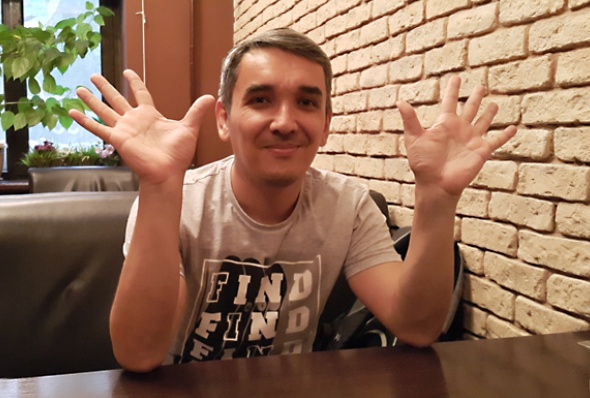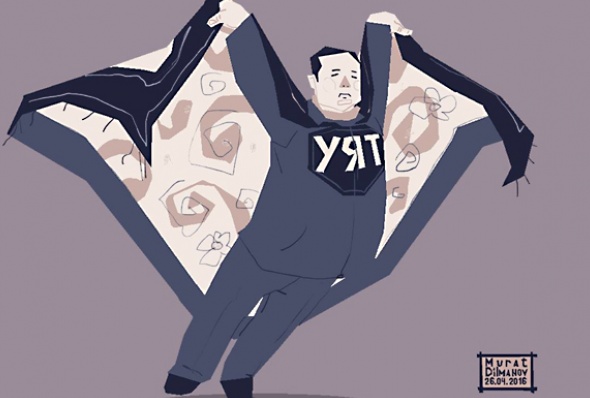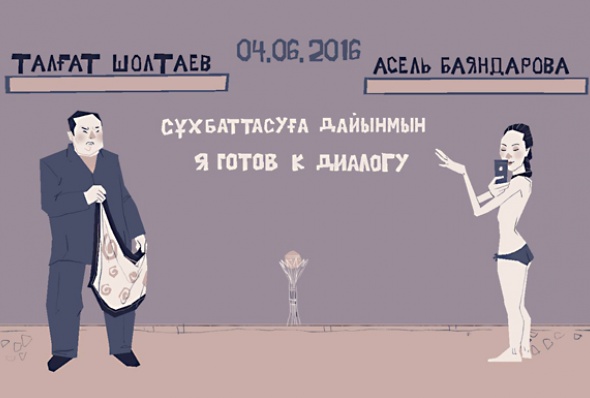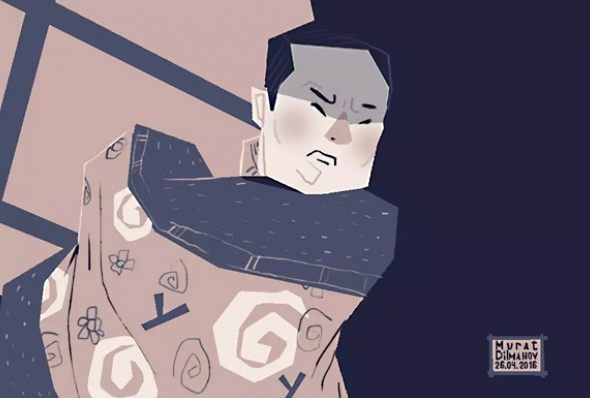How one artist is trying to stir public debate through humour.
By Aktan Rysaliev
Murat Dilmanov is a satirical cartoonist, an unusual profession in Kazakstan. While some topics, such as President Nursultan Nazarbayev remain taboo topics for comedy, he says it is possible to find other ways to explore social issues in his country.
For instance, one of his newest characters is known as Uyatman (Shame-man, as opposed to Superman). It was inspired by the actions of a lawyer Talgat Sholtaev, who visiting the capital Astana earlier this year covered a sculpture of female body he deemed too revealing with a scarf and then posted a photo online.
The work of art, entitled Bakytym Menin (My Happiness), was erected ten years ago and had long been criticised by traditionally-minded for being far too explicit.
Sholtaev’s actions sparked an angry online debate between conservative and liberal Kazaks.
So as well as creating his new cartoon character, Dilmanov arranged a public debate on conservative versus liberal social norms that included Sholtaev himself.
Dilmanov told IWPR that such interactions, as well as his own satirical efforts, showed it was possible to open up a whole new space for discussion in Kazak society.
IWPR: What was your rationale behind organising an offline meeting to discuss a topic that had been the subject of such intense discussion on social media?
Dilmanov: My idea was simple. First of all, I wanted to facilitate communication between people with opposing views. By organising that meeting, I wanted to prove that many problems emerging at a personal level can be solved through public dialogue…what is discussed online often becomes a matter of political concern.
Secondly, I tried to show that the news discussed on social and mainstream media and reality exist in two parallel worlds. For instance, about 90 per cent of online memes and funny images disseminated in Kaznet are fake, but surprisingly many people believe and react to it.
Domestic conflicts are being heated up by social media. Even seemingly intelligent people take part in [online] confrontations. I do not know who benefits from it.
You respond to current events by quickly coming up with caricatures, for instance, creating the character of Uyatman.
Our society has become too serious – it reacts vehemently and overreacts to everything. Have you noticed that almost none of Kazak print media publish satire?
I want to push these boundaries and liberate people’s minds that only see the world in white or black, as if there were no other colours.
The majority of people do not want change. There are people who think differently, but they… often end up leaving [the country].
Are there any taboo topics for your caricatures?
Hardly ever. All of my works are sort of “on the edge”. When you get on the sharp side of this, it can be dangerous. I’m balancing close to the edge, and it allows me to be trendy. I am interested in everything. I take the liberty to do anything without crossing a dangerous line.
One can touch upon religion or ethnicity, but without mocking them. Simple humour makes you laugh, while subtle humour is admired. I somehow touch on these difficult topics, but I try to do it very tactfully.
How about politics?
We haven’t got a political system, as it is ideally understood. People are not given the opportunity to speak out. It’s not common for us to make fun of, say, the party in power, not to mention the highest official [the president]. Therefore, cartoonists in Kazakstan can be counted on the fingers of one hand.
Recalling the Soviet period, satire was more active during periods of tighter censorship than, for instance, during Khrushchev’s so-called thaw of the 1950-60s. Do you think now is the time to talk about serious things using humour in Kazakstan?
Humour and satire are not tied to one country or to one regime. People always want to joke and discuss pressing concerns. Yet one needs to note that sharp political satire gains momentum when society begins to be more suppressed.
A great example is, perhaps, that of Iranian cartoonists. It seems to me that their satire is centred on ideas of patriotism, but at the same time it does contain subtle humour. The stronger the authoritarianism in the country is, the more artists express themselves through humour.
Which media platforms do you spread your caricatures on?
In my case it is mostly Facebook. [In Kazakstan] it has attracted precisely the age group that I’m looking for – from 32 years old and older. This audience perceives my works more or less favourably. On [the Russian-language social network] VK, cartoons are poorly perceived because its users are much younger.
You once called the internet a space for fair play. What did you mean by that?
Here is an example. An artist puts on a personal exhibition. People attending it tell an artist, in person, “What an excellent work, profound ideas, etc.” But not all such assessments are sincere.
However, nobody is too soft on the internet. They simply comment “that sucks”, if that’s what they think. I’m not afraid of that assessment. Although I do appreciate well-reasoned criticism, I don’t take it too personally. I reexamine my mistakes and work on improving my works. Critics inspire me. Therefore, I consider internet as the most honest form of exhibition.
What do you see as the main problem faced by Kazak society?
Corruption…the rest of troubles in our country come from it.
What will your next project be?
I’m planning to organise a puppet show, similar to the Muppet Show, but involving our own, [Kazak] characters.
I’ve came up with some characters, such as Divan-Batyr (Coach Hero), who is a guy who lives in the big city at the expense of his older brother. He surfs the web on his gadgets, generally wasting his life.
Another character is Pistegul, a charming [countryside] girl who is trying hard to look like a city girl, but she likes to nibble sunflower seeds and scatter them everywhere.
There are many other characters planned.
Through the comic situations my characters will find themselves in, I am going to talk about what’s happening in our society.
Aktan Rysaliev is the pseudonym of an Almaty-based journalist.
This publication was produced under IWPR project Strengthening Capacities, Bridging Divides in Central Asia, funded by the Foreign Ministry of Norway.





